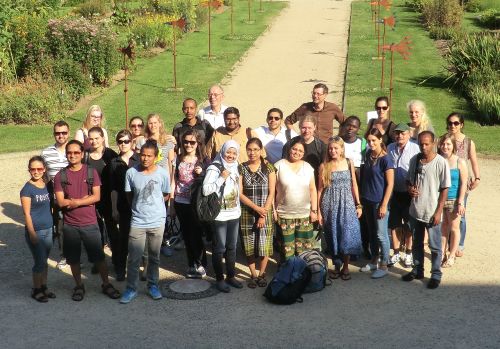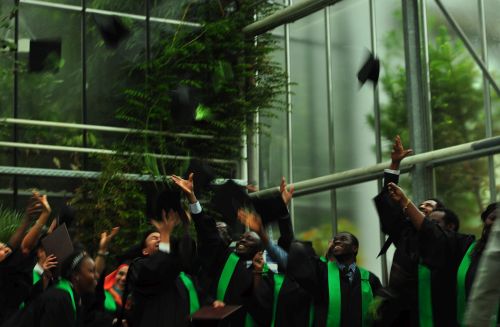Bonn University’s Agricultural Sciences and Resource Management in the Tropics and Subtropics (ARTS) programme, named one of the top ten most successful Master’s programmes in Germany by the Stifterverband für die Deutsche Wissenschaft (Association for the Promotion of Sciences and Humanities in Germany), is celebrating its 20th anniversary this year. Using creative approaches, ARTS prepares students for innovative careers in agriculture.
ARTS students come from all corners of the globe. They want to learn how to effectively manage ecological processes and production systems in their home countries, and how to adjust solutions to local conditions. In Bonn, they gain expertise in land use, livestock farming, and cultivation, and learn about the importance of keeping the local economic and social conditions in mind.
The students’ Master theses focus on typical problems in their home countries. One group of Nepalese students discovered that the soil in Nepal is losing too much nitrogen, while another group researched ways in which this loss could be prevented. “With these insights, the graduates contribute significantly to development research and improve their own chances in their home job markets at the same time,” says programme coordinator Professor Mathias Becker.
Real-life situations
“I was attracted by the diverse course offerings at ARTS,” says Rawan Miih from Palestine. The module “From Knowledge to Action” is unique: Interdisciplinary groups of Bachelor degree- holders from the environmental sciences, ecology and geography work are presented with real calls for tender. They develop a project, plan the budget, and write grant applications. In role plays, they have to defend their ideas in front of another group playing the role of the donor institution. “The module has proven itself in practice. Our students are able to implement this training straight away in their jobs,” recounts Mathias Becker.
The ARTS Club, which students brought to life eight years ago, is proof that two years of study together makes for strong bonds. Members pay regular contributions to fund excursions, or the graduation party. It adds additional value to the experience for graduates like Shree Pariyar, who is thankful for the Master’s programme. “ARTS gave me the chance to see the world from another perspective, and to grow as a person,” he says. “In a few years, I would like to return to my home country and apply my knowledge there.”
A future in agriculture
After the Master’s degree, many of the graduates work in their own countries – at universities, in national agricultural ministries, in research, or with NGOs. “In Gambia, the agricultural sector offers the most employment opportunities,” explains alumnus Badou Mendy. He learned of the Bonn Master’s programme from a bulletin board at his institute, and was instantly fired up. “Many young people in my country think that farming is a job for poor people. I would like lead the way as a good example, and change that attitude.”
Future plans include strengthening the collaboration within other development-related postgraduate study programmes in the area of resource management and working together to develop joint course modules. This would benefit students by giving them access to specialised knowledge on offer at other universities and colleges.
More information:
www.arts.uni-bonn.de







